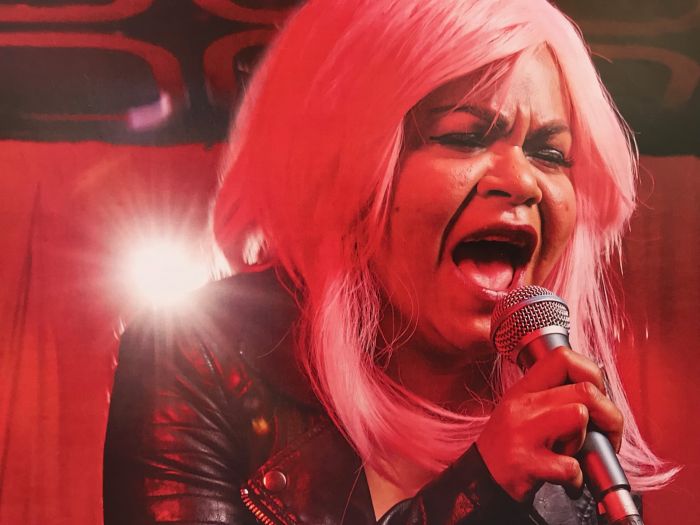Barbara and the Camp Dogs
Upstairs Theatre, Belvoir
Writers: Ursula Yovich & Alana Valentine
Musical Director: Jessica Dunn
Director: Leticia Cáceres
December 6-23, 2017
A profound and wonderful experience, Barbara and the Camp Dogs takes the audience on a journey from Sydney to Katherine, from anger to potential resolution, all the while sustaining the illusion they are attending a gig in a local hotel.
Against a blackboard, detailing pub information and a lovely chalk sketch of a sharp-looking canine in sunglasses, stand the Camp Dogs (Jessica Dunn, Michelle Vincent and Debbie Yapp), warming up for their performance while a roadie (Troy Brady) checks the sound equipment. Their name, dogs that hang around a camp hoping for scraps, indicates an estimation of their value as female musicians, a point emphasised during the performance.
A cluster of lights, directed towards the musicians and angled downwards, are blue, a smoky haze drifting beneath them. The swirling colours will change, matching the emotional intention of each segment and at crisis moments the lights will swivel to look directly and accusingly into the audience. Initially, as some of the audience were ushered into seats at tables or easy chairs in the space that usually defines the gap between performers and spectators, it is difficult to pretend that we, the audience, are not on display as part of another performance – our own, as Australians.
It is the volatile, confrontational Barbara (Ursula Yovich) who generates those crisis moments. When we first meet her, she and her more peaceable foster-sister René (Elaine Crombie), have ambitions to make it as pub singers in Sydney but are struggling to find gigs for themselves and their band. Their first duet, “Never Give an Inch… You’ve Got to Fight It”, expresses their struggle, intensified by racism and gender. As Barbara asserts, the music industry loves “women to look like nasty trouble but not really have a voice”. News of René’s mother’s illness, however, eventually leads them to the decision to return to Katherine, their hometown.
For Barbara, this will mean a painful revisiting of her childhood in which she was rejected and abandoned by both parents. Despite her reluctance, Barbara manages to solve the problem of getting from Darwin to Katherine by borrowing a motorbike, and the creation on stage of the pair, René astride the cycle, and Barbara in the sidecar – Priscilla meets Easy Rider – has the audience laughing helplessly.
Nevertheless, facing abandonment again through her foster-mother’s death is too difficult for Barbara, and she turns her anger against René, against herself, the “meanest, the pettiest, the most ungenerous country in the world”. The outcome is a breakdown in the relationship between René and Barbara and the bitter ballad “Brushing the Dust”.
In an attempt to atone, Barbara seeks out her brother Joseph (Troy Brady) from whom she had been separated by their father who chose to care for his son and abandoned his daughter. Movingly, she is able to let go some of her deep anger through a song sung to them both by their mother, the powerful “Chained to You”. It seems as if this connection with something larger than their individual struggle, something handed down through time, gives Barbara a sense she does belong. As we expect, René and Barbara are reconciled but only after Barbara apologises to her foster-sister. René’s response is memorable: “Well I know that, right now, in the moment, you really mean it, Barbara, I’m just over it in the moment, especially in your moment. But, I’m glad you said it.”
All is not resolved but the future may be better and harmony might prevail as expressed in the final song, “Let In the Love”.
Ursula Yovich gives a brilliant and eventually endearing performance as the out-of-control Barbara as she wriggles across tables, leaps onto sofas and hurls herself at cushions. She is like a natural force, a holy wind that scours society of its illusions. For blessed relief we turn to Elaine Crombie, who brings a lovely warmth and honesty to her role as the supportive but clear-sighted René.
The script, and its all-important songs (Yovich with Alana Valentine) that yield up the secrets of the characters’ inner lives, keeps its freshness and vitality under the confident direction of Cáceres. Many thanks to Vicki Gordon, for the inspirational example she sets in forging a path towards equality and justice. Finally, back to the musicians, whose skill and energy ignited and united a truly unique theatre experience.
_______________
theatre@ssh.com.au





